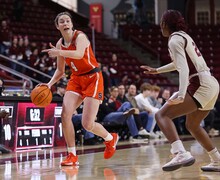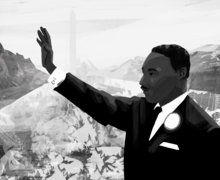Banned Book Week readout at Bird Library brings visibility to challenged books
Courtesy of Shantel Guzman
This year’s banned book read out was incredibly well-attended, with an audience of faculty and students staying at the event for roughly 2 hours.

It was standing room only at Bird Library’s Banned Book Week celebration Thursday.
At the event, hosted by several academic departments and programs, Syracuse University students, faculty and alumni gathered to read some of the most challenged books throughout history, such as “The Scarlet Letter” or the Bible. Over 20 readers shared passages from a range of books.
“The number you want to remember is 1,651… the number of titles that have been challenged so far this year,” said African American Studies professor Joan Bryant, who welcomed the audience. “That tells you something about how significant this read-out is. The point of doing a read out is to celebrate the freedom to read.”
This year’s banned books display, which features works about police shootings and LGBTQ relationships, focused on children’s literature, and how banning children’s books can prevent them from understanding the complexities of the world, according to the graduate student assistants who compiled it.
English professor Katherine Kidd read from “A Wrinkle in Time” by Madeleine L’Engle, which she teaches in her Children’s Literature English class. The book was banned because it allegedly promotes witchcraft and is anti-christian, Kidd said.
Patty Giles, Library Technician in the Department of Learning and Academic Engagement, also read “Are You There God? It’s me, Margaret” by Judy Blume, which is often banned or challenged for its discussion of religion, puberty and sexuality.
“I read it when I was 12,” Giles said. “I purchased it and then my mother found it and read it and was very upset with me and threw it away.”
Two presenters read “It’s Okay to Be Different” by Todd Parr, a picture book that encourages children to embrace their own differences, and accept the people around them for who they are.
“I think books should be read over, and over again,” said Juan Denzer, a computer science and engineering librarian who read the book for the second time. “I chose this one because I don’t think children should be excluded from hearing books.”
In previous years, the English and African American studies departments have hosted individual banned book readings. This was the first year the LGBTQ studies department and resource center helped co-host the event.
“Because of critiques of critical race theory and the banning of books on Black history and Black culture, and LGBTQ history, culture and experience we really wanted to partner with African American Studies and LGBTQ studies,” said Coran Klaver, Chair of the English Department. “We felt like those were the groups that were most impacted right now by banned books.”
Cristina Hatem, Director of Strategic Marketing & Communications for Libraries, said she hopes those who attended recognized the importance of this event and understanding the history of banned books.
“We wanted to encourage students to really recognize that there is a lot of material that not everyone has access to,” Hatem said. “It’s really important for us to encourage dialogue and conversation about that.”
Published on September 24, 2022 at 6:47 pm
Contact Shantel: sguzma01@syr.edu | @shantelguzman2






